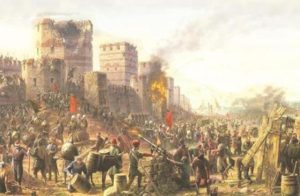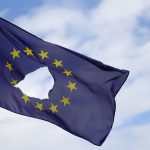There are many different ways to anthropologically categorize tribes, ethnicity, nations—large groups of people. One way I often view the race of men is through the lens of the three tribes of Noah: Semites, Japhetites, and Hamites. Japhetites pretty much became the white people of Europe, while the Hamites became the black people of Africa. Semites became the Hebrews, among others.
The Japethites of Europa, it seems, were the primary inheritors of the Christian tradition, and it is they who are largely responsible for evangelizing the world. However, throughout history they’ve lacked the tribal instincts necessary to protect themselves. And typically, in the long-term scheme of things, the Japhetites are usually swallowed up by the surrounding outsiders.
For example, consider the lost Byzantine Empire.
The Byzantine Empire
-

The siege of Constantinople.
A major power player throughout Christendom’s history, this Christian empire that you’ve likely never heard of lasted a thousand years. It was swallowed up by a horde of foreigners we remember as the Ottomans. Byzantium’s former Christian capital is now inhabited by a Muslim powerhouse that shows no sign of budging. So, how was the strength of this kingdom compromised? The answer is that Byzantium’s collapse was largely caused by internal decay.
The weakness of the Byzantines left them as prey to outside predators who were eager to swallow them up. Constantinople—their capital—couldn’t even serve as a proper launching platform for the Crusaders who had attempted to re-take the Kingdom of Jerusalem. Many times during the Crusades, Constantinople acted as a stage for internecine warfare among different European crusading factions who were supposed to be only passing through to the Holy Land. Crusades went to Constantinople to die.
The Byzantine Empire did not have its act together. This weakness was exploited by outside powers, and they fell to Islam, never to rise again. When the Turks came to take their city, the people were, in fact, willing to be subdued.
The Indo-Greeks of Afghanistan and Northern India
-

Alexander and his Bactrian wife, Roxana
Let’s look at another episode in history that is far more obscure. Ever hear of the Indo-Greek Kingdom? Basically, once upon a time, Alexander the Great plunged the spear of the Greek culture far into the heart of Asia. By the year 326 B.C., Alexander had pushed through the Hindu Kush of Afghanistan, all the way into India. Even the biblical book of Maccabees speaks of Alexander the Great’s mighty journey:
“Now it came to pass, after that Alexander the son of Philip the Macedonian, who first reigned in Greece, coming out of the land of Cethim, had overthrown Darius king of the Persians and Medes. He fought many battles, and took the strong holds of all, and slew the kings of the earth. And he went through even to the ends of the earth, and took the spoils of many nations, and the earth was quiet before him. And he gathered a power, and a very strong army, and his heart was exalted and lifted up. And he subdued countries of nations, and princes: and they became tributaries to him.”
Alexander the Great thought that he was to plant a Grecian stronghold on what was considered to be the other side of the known world. But alas, this kingdom was only to last two centuries before being swallowed up by the surrounding population of locals. Marriage treaties diluted the Greek influence within a generation, and the ethnicity of later Indo-Greeks is not very clear at all. Before long, a mixture of ethnicity and religion (Greek mythology, Buddhism, and the Bhagavata cult) made everything ambiguous.
By 70 B.C. the Indo-Greek Kingdom lost control over the Hindu Kush territories, the Central territories by 48 B.C., and the Eastern territories ten years before the birth of Jesus Christ. Although it might be said there was still some kind of Greek nuclei in Afghanistan and India up to 100 A.D., the Greek influence was surely gone by the time Islam had conquered Afghanistan in the 600s. To this day, it is only the tiny Punjab region of northern India that claims a mere 15% of Greek genetic origin.
The Roman Empire
-

General Stilicho
Let’s move to another Japhetite world superpower, the Romans. We all know that Rome fell. But the “how and why” is much more fascinating. Consider how it was the warm-hearted good intentions of the Roman emperor Valens that doomed his own Roman people. It was Emperor Valens who allowed desperate Ostrogoth women, children, the elderly, and 200,000 fighting men across the Danube River into Roman territory. The bloodthirsty, savage Huns were at their backs, and if they had caught up to the Ostrogoths, the Huns would slaughter them all.
The result of allowing in these poor refugees was that they turned against Rome, conquering the empire 38 years after being allowed to cross the Danube. “They’re just immigrants” one might argue. But these migrants managed to displace the Romans forever.
Could the Romans stop the Goths from sacking Rome? Well, there was once a general named Stilicho who could have stayed the invasion, at least for a little while. Like many foreign-born or mixed military men of our day, Stilicho was actually a mixed man himself, his mother being Roman, while his father was a Vandal. His military victories earned him great popularity. And yet, the moment he found a peaceful way to prevent Alaric from attacking Rome, all of the Roman Empire turned against him, killed him, his friends, and his family. The city of Rome was sacked two years later.
Just as it would be with Byzantium a thousand years later, the Romans did not have their act together. They were reckless in letting in the Ostrogoths. They were weak, corrupt, and effeminate in their policies. In fact, during the struggles with the Goths, Emperor Honorius was feeding his pet chickens and pigeons in his royal palace, such was the mishandling of the Roman people. The result was silted harbors, emptied cities, and a countryside filled with ruins, as Rutilius Namatianus describes it in “De Reditu suo”:
“I have chosen the sea, since roads by land, if on the level, are flooded by rivers; if on higher ground, are beset with rocks. Since Tuscany and since the Aurelian highway, after suffering the outrages of Goths with fire or sword, can no longer control forest with homestead or river with bridge, it is better to entrust my sails to the wayward.”
History is Replete With Examples
This is how Japhetites behave. This is how they end up squandering and losing the inheritance of their posterity. History has shown how they expand, but then fail to hold on to any stronghold whatsoever. They grow soft and weak, and then they are overcome by the surrounding populations. Time and again throughout history, Japhetites have made their mark somewhere in the world, but then they compromise in one form or another, and then everything is lost.
If there is ever a time when Japhetites have found a territory and held onto it, the cause is usually due to a geographical barrier that protects them, be it mountains or oceans. But in this day an age—a time of cars, trains, and air travel—there is absolutely nothing to keep out the outsiders other than the sheer willpower of the Japhetite.
As we have seen, Japhetites lack the stomach for the kind of physical and cultural self-defense necessary to protect their own posterity. And as a result, their countries are now becoming overloaded with outsiders who will replace them within a few generations. Technology is serving as a catalyst for their destruction.















5
How close we are to that scenario today.
The Ostrogoths are massing on our southern border
and are already among us for years now.
As predicted by Daniel’s 4th beast.
[…] Alt-Right, Meet Rad Haiti Spooked the American South: Part 1 Haiti Spooked the American South: Part 2 A Roman Easter Story for Dejected Trump Voters Thomas Jefferson on America’s Expiration Locusts American Locust Phenomenon: Supersized America, The Unsustainable Even British Clergy Wanted Alfie Dead Italian Constitutional Crisis and the EU’s Destruction Since Antiquity, Whites Cut Themselves Off at the Knees […]